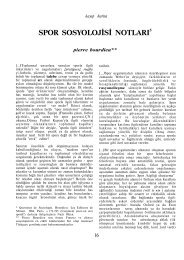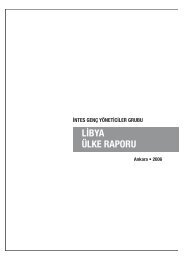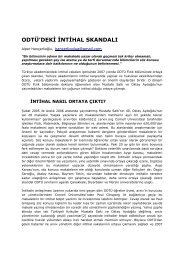Untitled
Untitled
Untitled
Create successful ePaper yourself
Turn your PDF publications into a flip-book with our unique Google optimized e-Paper software.
APPENDICES III<br />
directed. It is sustained by the notion that such contents represent<br />
ready-made facts, to be delivered to your home like commodities.<br />
Sentences like this express not just an attitude to a problem. Rather,<br />
this whole book has become a grappling with a section of everyday life,<br />
an inhabited Here and lived Now. Reality is so greatly neglected that it<br />
must show its colours and name names.<br />
The name is Berlin, which for the author is the city of employees<br />
par excellence; so much so that he is absolutely aware of having made<br />
an important contribution to the physiology of the capital. 'Berlin<br />
today is a city with a pronounced employee culture: i.e. a culture<br />
made by employees for employees and seen by most employees as a<br />
culture. Only in Berlin, where links to roots and the soil are so<br />
reduced that weekend outings can become the height of fashion, may<br />
the reality of salaried employees be grasped.' The weekend is also the<br />
province of sport. The critique of enthusiasm for sports among<br />
employees shows how little the author is disposed to compensate for<br />
his ironic treatment of the cultural ideals of the bien pensants by an all<br />
the more fervent profession of faith in nature far from it. The<br />
mistrust of instinct fostered by the ruling class is here countered<br />
precisely by the writer as protector of unspoiled social instincts. He<br />
has remembered his strength, which consists in seeing through<br />
bourgeois ideologies, if not completely, at least wherever they are still<br />
associated with the petite bourgeoisie. 'The spread of sport', Kracallc<br />
says, 'does not resolve complexes, but is among othe things<br />
symptom of repression on a grand scale; it does not prolllote the<br />
reshaping of social relations, but all in all major of<br />
depoliticization.' And still more decisively in anothn p. 'age: ';\<br />
supposed natural law is erected against the present-day ('("onolllic<br />
system without it being realized that precisely Nature, which is also<br />
embodied in capitalistic desires, is one of that system's most powcrflll<br />
allies; and that its perpetual glorification, moreover, conflicts wi th the<br />
planned organization of economic life.' In line with this hostility to<br />
Nature, the author precisely denounces 'Nature' where conventional<br />
sociology would speak of degenerations. For him a certain traveller in<br />
tobacco products, the personification of jauntiness and worldly<br />
wisdom, is Nature. It is hardly necessary to point out that in so<br />
consistent a thinking through of economics, which exposes the<br />
primitive not to say barbaric character of relations of production and<br />
exchange even in their contemporary abstract forms, the notorious<br />
mechanization takes on a very different emphasis than it has for social<br />
pastors. How much more promising, to this observer, is the soulless<br />
mechanized motion of the unskilled worker, than the thoroughly<br />
organic 'moral pinkness' that, according to the priceless formulation






